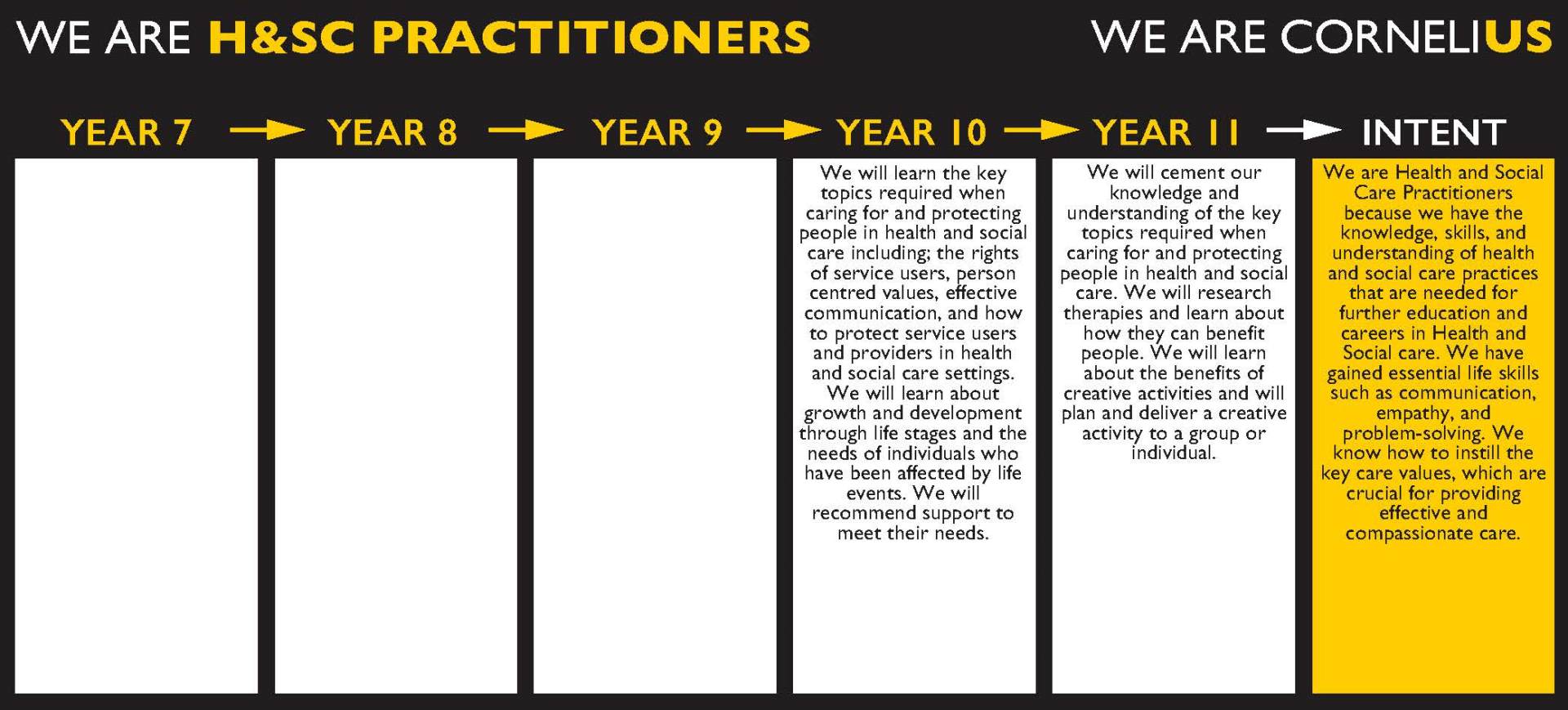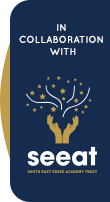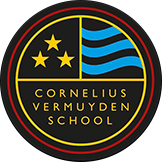Health and Social Care
Intent

Career Opportunities in Health and Social Care
Students can progress to college or apprenticeships in health and social care. Many students go on to study health and social care, psychology, sociology, social work, and nursing at college and university.
Year 10 Curriculum Overview
Autumn Term
| What are we learning? | What knowledge, understanding and skills will we gain? | What will excellence look like? | How will we recognise progress? |
|
R032 Principles of care in health and social care
|
Students will learn the importance of the rights of service users. and the person-centered values and how they can be applied to health and social care settings. They will learn to communicate effectively when providing care and support for service users in health and social care settings. And create a care environment that is safe and hygienic for service users and service providers.
|
Students will know examples of health care settings and social care settings. The rights of the service users in health and social care settings, and the benefits to Service users, health and well-being when their rights are maintained. They will be able to apply person and know the benefits of applying person centered values. The importance of effective communication skills, non-verbal communication skills and active listening skills in health and social care settings.
|
Students will answer mock/practice exam questions and papers to gain confidence for the external exam paper in year 11. They will use teacher and peer assessment comments to independently strengthen their knowledge. The exam is 1 hour and 15 minutes and has 70 marks. There are 6 compulsory questions including short and medium answers and extended responses.
|
Spring Term
| What are we learning? | What knowledge, understanding and skills will we gain? | What will excellence look like? | How will we recognise progress? |
| R033 Supporting individuals through life events | Students will Learn about life stages and the factors that affect them. Students will understand expected and unexpected life events and the impacts they will have on physical, social, emotional and social economic aspects in an individual's life. They will research the service providers and practitioners that can support individuals. Recommend, support and justify how this will meet the needs of a specific individual Whom they will have interviewed. | Students will know different life stages and key milestones of growth and development for each age group. They will know the physical, intellectual, emotional and social. Developments across each life stage and the factors that affect growth and development across the life stages. Students can give examples of sources of Support that include formal, informal and charities and know the practitioners involved to meet individual needs. | This is an OCR set NEA assessment. Marks will be submitted in May. It is marked out of 60 and grades are awarded as Level1 Pass, Merit, Distinction, Level2 Pass, Merit, Distinction and Distinction *. Students will be able to complete a new NEA assessment in Year 11 should they need to improve their mark. |
Summer Term
| What are we learning? | What knowledge, understanding and skills will we gain? | What will excellence look like? | How will we recognise progress? |
|
R032 Principles of care in health and social care (Revision) |
Students will recap the key topics previously learnt in autumn term that are important when caring for and protecting people in health and social care. | Students need to know the rights of the service users in health and social care settings, Person centered values, Effective communication in health and social care settings, Protecting service users and service providers in health and social care settings. | Students will answer mock/practice exam questions and papers to gain confidence for the external exam paper in year 11. They will use teacher and peer assessment comments to independently strengthen their knowledge. They will practice questions including short and medium answers and extended responses. |
|
R034 Creative and Therapeutic Activities Topic area 2&3
|
Students will study the types of creative skills and their benefits. They will plan a creative activity for individuals or groups in a health and social care setting. They will look at the different factors that affect the selection of the activity and learn how to plan a creative activity to meet individual abilities. | Students can give examples and explain the benefits of different types of creative activities to individuals in different health and social care settings. They will produce a plan for a creative activity of their choice and demonstrate full understanding of the activity's aims, timescales, resources needed, safety considerations, communication and the methodology to be used. | This is set through an OCR set NEA assessment. Marks will be submitted at the end of the Autumn term 2025. It is marked out of 60 and grades are awarded as Level1 Pass, Merit, Distinction, Level2 Pass, Merit, Distinction and Distinction * |
Year 11 Curriculum Overview
Autumn Term
| What are we learning? | What knowledge, understanding and skills will we gain? | What will excellence look like? | How will we recognise progress? |
|
R034 Creative and Therapeutic Activities Topic Area 4 and 1 and revisit topic areas 2 & 3. Complete NEA Tasks 1-4 |
Students will recap the topic areas 2 and 3 completed before the summer.
They will learn how to evaluate their own performance considering the skills/personal qualities required to encourage participation in the planned activity.
They will learn the different types of therapies available; Sensory, cognitive, expressive, and physical and learn about the physical, intellectual, emotional and social benefits of these. |
Students will deliver the creative activity they have planned. They must introduce the activity and supervise it using appropriate communication skills.
They will need to collect feedback from the participants to evaluate their own performance, evaluating the strength and weaknesses of their planning, communication skills and encouraging participation. Students will be able to give suggestions for improvements.
Students will describe therapies such as aromatherapy, reflexology, massage, Hypnotherapy, speech and language, Mind body healing. Reminiscence therapy. Art therapy. Play therapy. Yoga. Tai Chi, Reiki.
Students know the benefits of each therapy such as Improves movement, appetite and sleep. Reduces pain and blood pressure. Helps concentration and mental stimulus. Improve self-esteem, confidence, anxiety and depression. and helps connect with others, improving cooperation. |
This is set through an OCR set NEA assessment. Marks will be submitted in the January series and if necessary, resubmissions can be made in May. It is marked out of 60 and grades are awarded as Level1 Pass, Merit, Distinction, Level2 Pass, Merit, Distinction and Distinction * . An observation record is completed by the teacher for Delivering the activity. |
Spring Term
| What are we learning? | What knowledge, understanding and skills will we gain? | What will excellence look like? | How will we recognise progress? |
| R033 Supporting individuals through life events Topic areas 1-4 |
Students will Learn about life stages and the factors that affect them. Students will understand expected and unexpected life events and the impacts they will have on physical, social, emotional and social economic aspects in an individual's life. They will research the service providers and practitioners that can support individuals. Recommend, support and justify how this will meet the needs of a specific individual Whom they will have interviewed. | Students will know different life stages and key milestones of growth and development for each age group. They will know the physical, intellectual, emotional and social. Developments across each life stage and the factors that affect growth and development across the life stages. Students can give examples of sources of Support that include formal, informal and charities and know the practitioners involved to meet individual needs. | This is set through an OCR set NEA assessment. Marks will be submitted in May. Students will have completed the scenario from the previous year in Year 10 and are encouraged to complete the current assessment to improve their current mark. It is marked out of 60 and grades are awarded as Level1 Pass, Merit, Distinction, Level2 Pass, Merit, Distinction and Distinction*. |
| R032 Principles of care in health and social care (Revision) | Students will recap the key topics previously learnt that are important when caring for and protecting people in health and social care. | Students need to know the rights of the service users in health and social care settings, Person centered values, Effective communication in health and social care settings, Protecting service users and service providers in health and social care settings. | Students will answer mock/practice exam questions and papers to gain confidence for the the external exam paper in May/June. The exam is 1 hour and 15 minutes and has 70 marks. There are 6 compulsory questions including short and medium answers and extended responses. |
Summer Term
| What are we learning? | What knowledge, understanding and skills will we gain? | What will excellence look like? | How will we recognise progress? |
|
|
|
|
.
|



